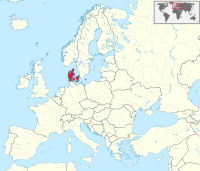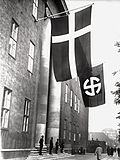Welcome to the Denmark Portal! | ||||

|

|

| |
Denmark is the smallest and southernmost of the Nordic countries. Unified in the 10th century, it is also the oldest. Located north of its only land neighbour, Germany, south-west of Sweden, and south of Norway, it is located in northern Europe. From a cultural point of view, Denmark belongs to the family of Scandinavian countries although it is not located on the Scandinavian Peninsula. The national capital is Copenhagen.
Denmark borders both the Baltic and the North Sea. The country consists of a large peninsula, Jutland, which borders Schleswig-Holstein; many islands, most notably Zealand, Funen, Vendsyssel-Thy, Lolland, and Bornholm; and hundreds of minor islands often referred to as the Danish Archipelago. Denmark has historically controlled the approach to the Baltic Sea, and those waters are also known as the Danish straits.
Denmark has been a constitutional monarchy since 1849 and is a parliamentary democracy. It became a member of the European Economic Community (now the European Union) in 1973. The Kingdom of Denmark also encompasses two off-shore territories, Greenland and the Faroe Islands, both of which enjoy wide-ranging home rule. The Danish monarchy is the oldest existing monarchy in Europe, and the national flag is the oldest state flag in continuous use.
Selected biography

Bjørn Lomborg (born January 6, 1965) is a Danish political scientist and former director of the Environmental Assessment Institute in Copenhagen. He is most known for his best-selling book The Skeptical Environmentalist, its controversial claims, and the allegations of scientific dishonesty that followed it. He is now an adjunct professor at the Copenhagen Business School.
Lomborg is also a vegetarian (although he is not a supporter of animal rights), and known to wear jeans to formal business meetings.
According to an interview published in 2005 by the San Francisco Examiner, the book he would most liked to have written is Guns, Germs, and Steel: The Fates of Human Society, by Jared Diamond.
Bjørn Lomborg spent one year as an undergraduate at the University of Georgia, earned a Master's in political science at the University of Aarhus in 1991, and earned a Ph.D. at the Department of Political Science, University of Copenhagen, 1994.
Recently selected: Tycho Brahe - Ludvig Holberg - Karen Blixen
Selected picture

Photo credit: Bill Ebbesen
Selected article
The occupation of Denmark was never an important objective for the German government. The decision to occupy its small northern neighbour was made to facilitate the invasion of the strategically more important Norway; and as a means against the expected British campaign in Norway. German military planners believed that a base in the northern part of Jutland, most importantly the airfield of Aalborg, would be essential to the invasion of Norway, and they began planning the occupation of parts of Denmark, but as late as February 1940, the decision to occupy Denmark had not yet been made. The issue was finally settled when Hitler personally crossed out the words die Nordspitze Jütlands (the Northern tip of Jutland) and replaced them with Dä, a German abbreviation for Denmark.
Selected place
Famous for its main drag, known as Pusher Street, where hash and skunk weed were sold openly from permanent stands until 2004, it nevertheless does have rules forbidding 'hard drugs', such as cocaine, amphetamine, ecstasy and heroin. The region negotiated an arrangement with the Danish defence ministry (which still owns the land) in 1995. Since 1994, residents have paid taxes and fees for water, electricity, trash disposal, etc. The future of the area remains in doubt, though, as Danish authorities push for its removal.
Categories
Denmark topics
Things you can do
- Expand stubs:
Geography stubs · People stubs · Denmark stubs in general
Help us extend these stubs and make them real articles!
- Categorize:
Help us categorize Denmark-related articles
- WikiProjects:
Have a look at WikiProject Denmark, WikiProject Faroe Islands, WikiProject Greenland and WikiProject Norse history and culture
- Noticeboard:
Have a look at the Danish Wikipedians' notice board
- Geotag:
Find coordinates for these locations and tag them: articles missing geocoordinate data
Related portals
Northern Europe
Other countries
Associated WikiMedia
The following Wikimedia Foundation sister projects provide more on this subject:
-
Commons
Free media repository -
Wikibooks
Free textbooks and manuals -
Wikidata
Free knowledge base -
Wikinews
Free-content news -
Wikiquote
Collection of quotations -
Wikisource
Free-content library -
Wikispecies
Directory of species -
Wikiversity
Free learning tools -
Wikivoyage
Free travel guide -
Wiktionary
Dictionary and thesaurus












